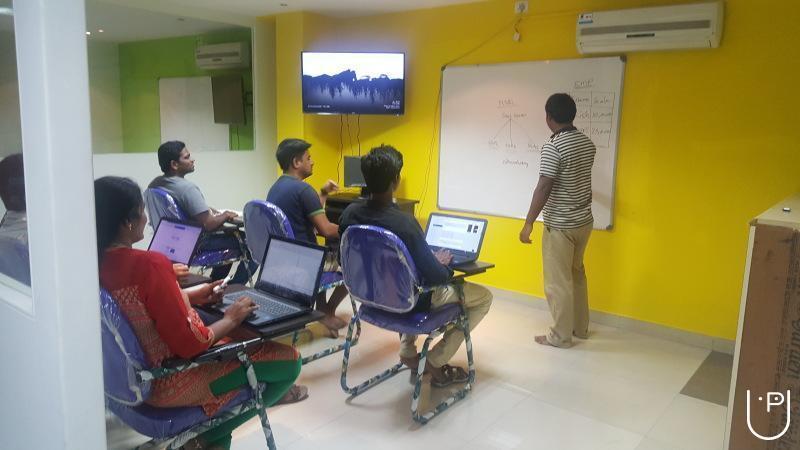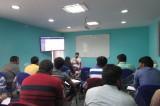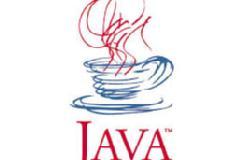S graph Infotech is one of the pioneers in software training. We delivered the training for many individuals, groups, and corporations. We prioritize to give our best quality of training and further assistance. You have complete freedom to customize course topics and time. Online training is a good experience and a generation ahead. Register yourself for unbelievable prices.
Core Java concepts:
- Lesson 1: Introduction to Java
1.1: Introduction to Java
1.2: Features of Java
1.3: Evolution in Java
1.4: Developing software in Java
- Lesson 2: JVM Architechture
- Lesson 3: Language Fundamentals
3.1: Data Types
3.2: Keywords
3.3: Operators and Assignments
3.4: Flow Control: Java’s Control Statements
3.5: Method with Variable Argument Lists
3.6: Objects and Classes
3.7: Arrays
3.8: Declaring Type Safe Enums
3.9 OOPS Features in Java – Inheritance and Polymorphism
3.10: Other Modifiers – abstract, static and final
3.11: The Object Class
3.12: The System Class
3.13: String Handling
3.14: Wrapper Classes
3.15: Common Best Practices
- Lesson 4: Packages and Interfaces
4.1: What is an Interface?
4.2: Packages
4.3: Access Specifiers and Modifiers
- Lesson 5: Reflection API
- Lesson 6: Files and Streams
6.1: Overview of I/O Streams
6.2: Types of Streams
6.3: The Byte-stream I/O hierarchy
6.4: Character Stream Hierarchy
6.5: Buffered Stream
6.6: Data Stream
6.7: The File class
6.8: Object Stream
6.9: Scanning and Formatting
6.10: Best Practices in I/O
6(A). Lesson 6: Multithread Programming
- Lesson 7: Property Files
7.1: What are Property Files?
7.2: Types of Property files
7.3: User defined Properties
- Lesson 8 : Regular Expressions
8.1: Regular Expressions
- Lesson 9:AWT,Swings,Applet
Additional concepts:
- 3 as an IDE
- Jboss and Tomcate
Advanced Java:
- Lesson 10: Collections
10.1: Collections Framework
10.2: Collection Interface Methods
10.3: Generics
10.4: Enhanced For Loop
10.5: AutoBoxing with Collections
10.6: Implementing Classes
10.7: The Legacy Classes and Interfaces
10.8: Common Best Practices on Collections
- Lesson 11: Exception Handling
11.1: Exception Handling – Fundamentals
11.2: Exception Types
11.3: Handling Exceptions
11.4: Creating Application Specific Exceptions
11.5: Best Practices on Exception Handling
- Lesson 12: Java Database Connectivity (JDBC 3.0)
12.1: Java Database Connectivity - Introduction
12.2: Database Connectivity Architecture
12.3: JDBC APIs
12.4: Database Access Steps
12.5: Using Transaction
12.6: Connection Pooling
12.7: DAO Design Pattern
12.8: JDBC Best Practices
- Lesson 13: Annotations
13.1: What are annotations?
13.2: Advantages of annotations
13.3: Types of Annotations
13.4: Creating Annotations
13.5: Using Annotations
13.6: Testing the Annotations
- Lesson 14: Java Security
14.1: Java Security Architecture
14.2: Default Policy Implementation and Policy File
14.3: Certificates
14.4: Tools
Servlets :
- Lesson 1: Java Web Applications
1.1: Introduction to Tiered Architecture
1.2: Web Applications – An Overview
1.3: What are Web Components?
1.4: What are JEE Containers?
- Lesson 2: Introduction to Servlets
2.1: Introduction to Servlet
2.2: Role of Servlets in Web Application Design
2.3: Advantages of Servlets
2.4: Basic Servlet Architecture
2.5: Servlet Lifecycle
2.6: Elements of a Web Application
2.7: Developing Servlets
2.8: Initializing Servlets
2.9: Retrieving Information
- Lesson 3: The Request Object
3.1: Processing Get and Post Requests from Web Clients
3.2: Retrieving Path Information
3.3: Request Headers
- Lesson 4: The Response Object
4.1: Structure of a Response
4.2: Setting Response Headers
4.3: ClientPull
4.4: Logging
- Lesson 5: Configuring databases in Jboss
5.1: Database Configuration in JBoss
- Lesson 6: Session tracking
6.1: Introducing Session Tracking
6.2: Ways of Session Tracking in JEE
6.3: Session Management
6.4: Best Practices
- Lesson 7: Inter-Servlet Communication
7.1: Introducing Inter-Servlet Communication
7.2: RequestDispatcher Interface
7.3: Communication with Server Resources
7.4: Sharing Data between Servlets
- Lesson 8: Servlet Filters
8.1: Introduction to Servlet Filter
8.2: Filtering Components
8.3: Programming a Filter
8.4: Filter Configuration
8.5: Filter Life Cycle
- Lesson 9: SSL(Secure Socket Layer)
9.1: SSL and JBoss
9.2: SSL Configuration in JBoss
JSP:
Less on 1: Introduction to JSP 2.1
1.1: Introduction to Java Server Pages
1.2: Features of JSP 2.1
1.3: Access Models
1.4: Advantages of JSP over competing technologies
Lesson 2: Writing JavaServer Page
2.1 : Developing a Simple Java server Page
2.2 : JSP Processing Model
2.3 : Comments and Character Coding Conventions
- Lesson 3 : JSP Scripting Elements
3.1 : Forms of Scripting Elements
3.2 : Predefined Variables
3.3 : Examples using Scripting Elements
- Less on 4: JSP Directives
4.1 : JSP Directives
4.2 : JSP Page Directive
4.3: JSP Include Directive
- Less on 5: JSP Actions
5.1: JSP Actions
5.2: jsp:include Action
5.3: jsp:forward Action
5.4: jsp:plugin Action
5.5: Java Beans
5.6: Bean Related Actions
- Lesson 6: Custom Tags
6.1 : What is Custom Tag?
6.2 : Types of Tags
6.3 : Creating Custom Tags
6.4 : Resource Injection on the Web Tier
- Less on 7: Advance Custom Tags
7.1 : Introduction
7.2 : Using Simple Tag
7.3 : Using tag files
- Lesson 8: JSP Standard Tag Library (JSTL)
8.1 : What is JSTL?
8.2 : Why JSTL?
8.3 : Using Expression Language
8.4 : Using JSTL
Frameworks(J2EE):
Spring 3.0:
- Lesson 1: Introduction to Spring Framework
1.1. What is Spring Framework, Benefits of Spring
1.2. The Spring architecture
1.3. IOC – Inversion of control, wiring beans
1.4. Bean containers, lifecycle of beans in containers
1.5. Customizing beans with BeanPostProcessors &
BeanFactoryPostProcessors
1.6. Annotation-based configuration
- Lesson 2: Introduction to SpEL (Spring Expression Language)
2.1. SpEL Expression fundamentals
2.2. Expression Language features
2.3. Reduce configuration with @Value
- Lesson 3: AOP (Aspect Oriented Programming)
3.1. AOP concepts
3.2. AOP support in Spring using @AspectJ support
3.3. AOP support in Spring using Schema-based AOP support
- Lesson 4: DAO support in Spring
3.1. Data access using JDBC, JdbcTemplate
3.2. SimpleJdbcTemplate and NamedParameterJdbcTemplate class
3.3. Modeling JDBC operations as Java objects
- Lesson 5: Spring MVC framework
5.1. Introduction: The DispatcherServlet, Handler mappings, Resolving
views
5.2. Annotation-based controller configuration
- Lesson 6: Spring and Transactions
6.1. Spring Transaction Managers
6.2. Programmatic & Declarative transaction management
6.3. Transaction Attributes
- Lesson 7: Testing
7.1. Testing Spring applications
7.2. Spring’s TestContext framework
Struts 2.0:
- Lesson 1: Introduction
1.1: What is Struts2.0?
1.2: Why choose Struts2.0?
1.3: Webwork2.0, Struts1.0, and Struts2.0
- Lesson 2: Overview of Struts2.0
2.1: Architectural Aspects of Struts2.0
2.2: New Features of Struts2.0
2.3: High-level Overview – Struts2.0 Framework
2.4: MVC in Struts2.0
2.5: Request Processing Life Cycle Workflow
2.6: Configuring the Struts2.0 Framework
- Lesson 3: Struts2.0 Actions
3.1: Role of Actions in Struts2.0
3.2: Packaging Actions
3.3: Implementation Actions
3.4: Commonly used Interfaces in Struts2.0
- Lesson 4: Struts2.0 Interceptors
4.1: Aspect-Oriented Programming
4.2: Interceptors – Struts2.0
4.3: Interceptor Order
4.4: How do Interceptors Work Together with Actions?
4.5: Configuring Interceptor
4.6: Mapping Interceptors to Actions
4.7: Default Configuration: Struts-default.xml
4.8: How to Configure an Interceptor?
4.9: Types of Interceptors
- Lesson 5: OGNL and Type Conversion
5.1: The Concept of OGNL and ActionContext
5.2: Conversion Errors and Null Property
5.3: Advanced Type Conversion
- Lesson 6: Generic Tags and UI Compone nt Tags
6.1: Struts2.0 Tags – Generic Tags
6.2: Form UI Tags
6.3: Non-Form UI tags
6.4: OGNL – Useful Features
- Lesson 7: Validation Framework
7.1: What is Validation Framework?
7.2: Using Validation Framework
7.4: Using Custom Validators
7.5: Additional Topics on Validators
8.Hibernate Core
9.Hibernate Annotations
Additional Concepts:
- HTML
- XML
- Junit
- Log4j
Databases : SQL, PL/SQL, Oracle 10G, MySQL
IDE : Eclipse, Netbeans, MyEclipse
Servers : Tomcat, Web Logic, JBoss
Note:Fully practicals training ,live project explanation ,conducting exams for each modules ,resume preparation with project explanation and conducting interview after course completion.














